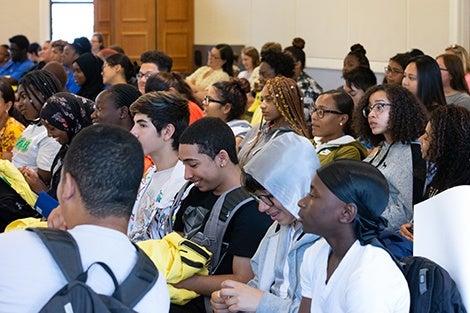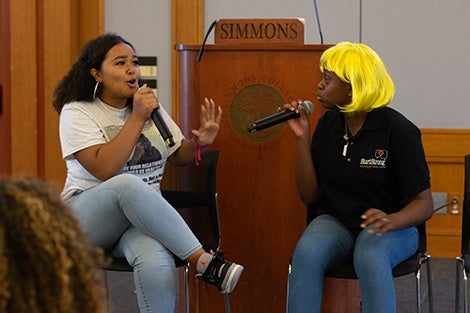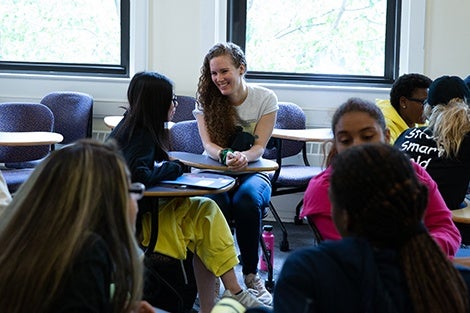Service learning project gives student on-the-ground view of a youth-led program that promotes healthy teen relationships
September 17, 2018 – Interviewing young people who had spent some of their high school years as peer leaders in a program to reduce teen dating violence, Natalie Johnson was struck by how many cited the importance of good communication.
Johnson, an MPH-65 student in social and behavioral sciences at Harvard T.H. Chan School of Public Health, focused on maternal/child health and children, youth, and families, has conducted numerous interviews as part of her summer work at the Boston Public Health Commission’s Start Strong program. Start Strong provides teens aged 14-18 with six weeks of training in preventing dating violence and promoting healthy relationships, after which they serve as peer leaders in their communities, teaching other young people and adults in schools and community centers across Massachusetts and the U.S. Johnson has been interviewing alumni of Start Strong’s peer leader program, asking how it has impacted their lives since graduating from the program. She’ll produce a report on her findings in the next few months.
Johnson’s work is supported by a Rose Service Learning Fellowship. Funded by a gift from Deborah Rose, SM ’75, the Rose Fellowships support students and post-doctoral fellows at Harvard Chan School to engage in service learning projects in the U.S. or abroad. Eighteen masters and doctoral students received fellowships in the spring of 2018.
“A lot of the people I interviewed talked about how Start Strong really drives home the importance of communication, about using ‘I’ statements, and about how helpful it’s been to have a good model of how to communicate when you’re having a relationship issue,” said Johnson, who is slated to graduate in 2019. “Many told me that the emphasis on communication has continued to serve them in their personal as well as their professional lives.”

Johnson’s other duties over the summer included helping plan and promote Start Strong’s “Break Up Summit,” an annual event for high schoolers focused on healthy relationships and breakups, sponsored by the Boston Public Health Commission. The summit, held July 26 at Simmons College in Boston, drew roughly 250 teens from Boston and beyond. The current group of Start Strong peer leaders ran small group workshops at the summit and starred in a skit about a problematic teen relationship. The summit also included the presentation of a Start Strong web video series called “The Halls,” focused on young men’s struggles with relationships, trauma, masculinity, and identity.

Mindset shifts
Alumni of Start Strong’s peer leader program told Johnson that they’re applying concepts they learned from their experience both in their own relationships and in giving advice to friends. For example, one former peer leader said that when a friend was struggling with an unhealthy relationship, she might have said in the past, “You should leave.” But instead she told her friend that she supported her and stressed that it was the friend’s decision whether to stay in the relationship or go.
“That shift in mindset is incredible,” Johnson said. “It seems like a lot of the young people I interviewed really understood that being supportive and offering options—not simply telling someone what to do—is the foundation of being an advocate for violence prevention and an effective friend.”
She added that a number of Start Strong alumni are excelling in college and many are already on their own path to careers in youth development or public health.
Dailin Morfa, a 16-year-old junior at Brooke High School in Boston, is a current Start Strong peer leader. She said she has appreciated learning about what both healthy and unhealthy relationships look like and is looking forward to sharing the lessons she’s learned with peers and community members in the year to come. In addition, she’s already using those lessons in her own life. “Sometimes you get into an argument with your friends and you do something that doesn’t help,” she said. “With Start Strong, we’ve learned how to continue to build positive relationships rather than having a bunch of problems.”
Unique opportunity
Johnson was one of 18 Harvard Chan School students named Rose Service Learning Fellows this year. Funded by a gift from Deborah Rose, SM ’75, the Fellowship supports students and postdocs to participate in service learning projects—in which students use their academic skills to address community needs—in the U.S. and abroad.
“It’s been an incredible summer,” said Johnson, who has past experience working with teens at an adolescent health center and who hopes to continue such work in the future. “Having the opportunity to work in the field this summer in an evidence-based program that’s so well-respected and so highly regarded nationally—in addition to being really fun—has been fundamental to my MPH experience. And, coming from a background in adolescent sexual health and risk behavior, it’s been really exciting to see how participation in positive, youth-led development programming can be such a powerful protective factor throughout adolescence and beyond.”
photos: Nilagia McCoy
